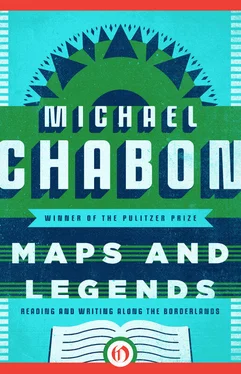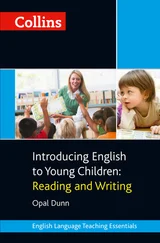Like a house on the borderlands, epic fantasy is haunted: by a sense of lost purity and grandeur, deep wisdom that has been forgotten, Arcadia spoilt, the debased or diminished stature of modern humankind; by a sense that the world, to borrow a term from John Clute, the Canadian-born British critic of fantasy and science fiction, has “thinned.” This sense of thinning — of there having passed a Golden Age, a Dreamtime, when animals spoke, magic worked, children honored their parents, and fish leapt filleted into the skillet — has haunted the telling of stories from the beginning. The words “once upon a time” are in part a kind of magic formula for invoking the ache of this primordial nostalgia.
But serious literature, so called, regularly traffics in the same wistful stuff. One encounters the unassuageable ache of the imagined past, for example, at a more or less implicit level, in American writers from Cooper and Hawthorne through Faulkner and Chandler, right down to Steven Millhauser and Jonathan Franzen. Epic fantasy distills and abstracts the idea of thinning — maps it, so to speak; but at its best the genre is no less serious or literary than any other. Yet epic fantasies, whether explicitly written for children or not, tend to get sequestered in their own section of the bookstore or library, clearly labeled to protect the unsuspecting reader of naturalistic fiction from making an awkward mistake. Thus do we consign to the borderlands our most audacious retellings of what is arguably one of the two or three primal human stories: the narrative of Innocence, Experience, and, straddling the margin between them, the Fall.
Any list of the great British works of epic fantasy must begin with Paradise Lost, with its dark lord, cursed tree, invented cosmology, and ringing battle scenes, its armored, angelic cavalries shattered by demonic engines of war. But most typical works of contemporary epic fantasy have (consciously at least) followed Tolkien’s model rather than Milton’s, dressing in Norse armor and Celtic shadow the ache of Innocence Lost, and then, crucially, figuring it as a landscape, a broken fairyland where brazen experience has replaced the golden days of innocence; where, as in The Chronicles of Narnia, it is “always winter and never Christmas.”
A recent exception to the Tolkienesque trend is Pullman’s series of three novels, The Golden Compass, The Subtle Knife, and The Amber Spyglass (with a promised fourth, The Book of Dust), which reshuffle, reinterpret, and draw from Milton’s epic both a portion of their strength and their collective title: His Dark Materials.
There are broken lands in His Dark Materials —there are entire broken universes, in fact, whose vital stuff is leaking from them into the Miltonic abyss at a frightening rate. But the central figuring of Innocence and the Fall Pullman accomplishes neither through the traditional mapping of a landscape nor, as in Jack Vance’s classic The Dying Earth, through melancholy reiteration of the depleted catalog of a once-vast library of magical texts and spells. Instead, Pullman has looked around at this broken universe of ours, in its naturalistic tatters, and has indicated, like Satan pointing to the place on which Pandemonium will rise, the site of our truest contemporary narratives of the Fall: in the lives, in the bodies and souls, of our children.
2.
Lyra Belacqua is a girl of ten or eleven when The Golden Compass, the first volume of the series, begins. Her parentage, in the traditional manner, is uncertain, at least to her. She is headstrong, cheerful, forthright, loyal, and articulate, rather in the Dorothy Gale style of female fantasy heroines. She is also an uncouth, intractable, manipulative liar, and occasionally stupid. The first time we encounter her, she is engaged in an act of inadvisable disobedience — trespassing in the Retiring Room at Jordan College, Oxford, which is strictly off-limits to all but Scholars — one whose consequences, which she imagines as no worse than chastisement, will include but not be limited to wide-scale ecological disaster and the death of her best friend. She has, in other words, a complexity of character, and a tragic weakness unusual for a work of children’s literature, and in fact the question of whether or not His Dark Materials is meant or even suitable for young readers not only remains open but grows ever more difficult to answer as the series progresses. This indeterminacy of readership — the way Pullman’s story pulses fitfully between the poles of adult and children’s fiction, illuminating by weird flashes that vague middle zone known in the librarian trade as YA — is, as I have already suggested, itself a figuring- or working-out of the fundamental plot of His Dark Materials, which turns, and turns again, on the question of what becomes of us, of our bodies and our souls, as we enter the borderland of adolescence.
Lyra lives in a room at Jordan College, where she has led a half-feral, largely pleasurable life as the seditious, indifferently educated ward of the college, looked after by a gruff old housekeeper and a faculty of male scholars who have no idea what to make of or do with her. Her childhood, an unbroken series of small adventures, hair-raising exploits, and minor wars among the local tribes of Oxford’s children, is evoked by Pullman in the first book’s opening chapters with verve, humor, and the special poignance of his foreknowledge, and our strong suspicion, that it is Lyra’s childhood — and indeed Childhood itself — that will prove to be the irrecoverable paradise, the Dreamtime, of his story.
There is, of course, no Jordan among the colleges of Oxford University. Lyra’s Oxford exists in a different universe, one in which, as in our own, it is a primary center of learning and scholarship for England, Europe, and the world, has deep ecclesiastical roots, and sits astride the Thames River, on a bend known locally as the Isis. But in Lyra’s world, though it strongly resembles our own in many ways — including possessing what appears to be an identical geography — evolution and history have taken different bends. Here, during the Reformation, the Holy See was transferred from Rome to Geneva; at some point John Calvin became pope. Somehow this, and a number of other premises, most of which Pullman leaves unstated, form a syllogism whose conclusion is a world united under the rule of a powerfully repressive Church Triumphant that is itself fatally divided among warring factions of bishops and prelates banded into orders whose names are at once bland, grand, and horrible: the Consistorial Court of Discipline, the General Oblation Board (charged with preparing oblations, or offerings, whose nature is at first a source of considerable mystery). What we know as science, in particular physics, is viewed in Lyra’s world as a subject fit for philosophers and above all for theologians — the study of fundamental particles is known there as experimental theology. Its discoveries are subject to ultimate review by the Church, and painful is the reward awaiting those, like a certain Russian Dr. Rusakov, who posit the existence of phenomena that violate Church teaching.
Lyra’s world, with its shuffled deck of underlying premises, is technologically accomplished in ways that equal and even exceed our own — helped in this regard by its willingness to view as controllable natural phenomena what our world would call magic — and in other ways strangely retarded or perverse. Electric power is widely in use, though it is known as “anbaric power” (the terms are etymologically akin, deriving from the Greek and Arabic words for amber), produced by great river-spanning dynamos and “atom-craft” plants, but guns have no ascendancy, refrigeration and the science of food preservation appear to be unknown, and computers and automobiles are little in evidence. Instead travel proceeds on foot, by boat, or by that colophon of alternate-world fiction from Ada to The League of Extraordinary Gentlemen, the grand zeppelin liner. But for all its neo-Edwardian style, Lyra’s Oxfordshire appears largely to remain sunk in the Middle Ages — agrarian, semifeudal, reckoning its calendar by harvest and fair and by the seasonal comings and goings of a small, fierce nation of people known as Gyptians, led by their king, John Faa, whose name appears, in our world, in a well-known fifteenth-century English ballad about a gypsy king.
Читать дальше
Конец ознакомительного отрывка
Купить книгу












